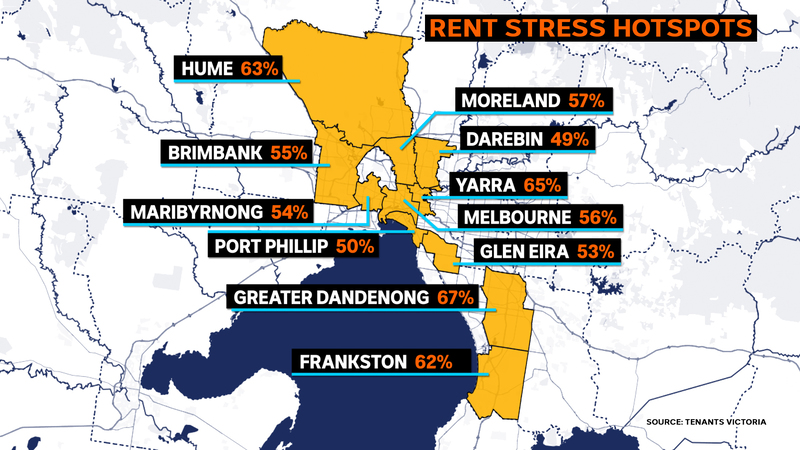Push to reinstate Victoria's COVID-19 eviction freeze as Tenant Victoria lockdown survey reveals rental pain By Neelima Choahan
Key points:
• Tenants Victoria conducted a snapshot survey of renters from July 28 to August 3
• Of the 684 respondents, 69 per cent say the 12-day lockdown in July impacted them financially
• The report has renewed calls for the state government to reintroduce a safety net for renters, including suspending evictions

Trevor Hines works full time, but he and his family have just $150 left to live on after paying rent this week.
Like many Melburnians, the hospitality manager has no work during the lockdown and his only income is $750 in COVID-19 disaster payments.
Mr Hines, whose wife gave birth to their second child three weeks ago, says the money is barely enough to cover the weekly $600 rent.
"[We are left with] $150 for a family of four, [which] isn't a lot, especially as my wife is not earning at the moment," Mr Hines said.
"My wife is not entitled to any maternity leave … she had to work a minimum of 300 hours for the year [to be eligible], but because we were in lockdown she couldn't."
Mr Hines said the disaster payment only covered 50 per cent of his pay and left young families like his under huge financial stress.
And he is not alone
Tenants Victoria, the peak body for the state's renters, conducted a snapshot survey of renters from July 28 to August 3 — just after the fifth lockdown ended.
Of the 684 respondents, 69 per cent said they had been financially impacted due to the 12-day lockdown in July 2021.
The report has renewed calls for the state government to reintroduce a safety net for renters, including rent relief grants to support renters and landlords and suspending evictions during any COVID-19 lockdowns.
Victoria's year-long pandemic rental supports, including an eviction moratorium, a rent freeze and rent relief grant, ended on March 28 this year, alongside key federal government supports such as JobKeeper and the temporary coronavirus supplement for people receiving Jobseeker payments.
Victoria has recently re-introduced pandemic support for commercial renters and landlords, but nothing yet for residential renters and landlords.
The Pandemic Pain, Victorian renters in lockdown report showed the highest number — or 67 per cent of those experiencing rental stress — lived in the outer Melbourne area of Greater Dandenong City Council and 49 per cent lived in the inner-city Darebin City Council.
Tenants Victoria chief executive Jennifer Beveridge said they were deeply worried about the extent of rent stress in the community.
"It's clear that many Victorian renters are struggling to pay their rent and they face the very real risk of eviction at a time when, for the sake of our health, we are still being directed to stay at home," Ms Beveridge said.
"We urgently need a safety net for renters facing tough times with the Delta variant on the rise."
Government says 'no gap in protection'
When asked if there were any plans to reintroduce the pandemic renter support, including an evictions moratorium, a government spokeswoman said they had introduced more than 130 reforms to strengthen renters' rights in March this year.
"There was no gap in protections for renters once the eviction moratorium ended," she said.
"Under our new rental laws, a renter cannot be evicted unless the Victorian Civil and Administrative Tribunal (VCAT) decides that it is reasonable and proportionate in the circumstances.
"We'll continue to monitor the impacts on renters that are out of work because of this pandemic, or are doing the right thing and protecting all of us by following public health orders and as result temporarily can't pay their rent."
Ms Beveridge said though the amendments favoured renters and enabled them to have better quality and more secure tenure in their homes, it wasn't designed to take account of the pandemic.
Migrants and refugee communities struggling
Bol Aweeng Machar is the chair of the Dinka Community Union of Victoria.
Mr Machar said lockdowns and the resultant loss of work affected the refugee and migrants, including the South Sudanese people, disproportionately.
"Most of our community members are working as a security guards … some of them as cleaners … some of them are part time, some of them are casual," he said.
"They have severe financial issues. Because most of them lost a job or some of them had their hours reduced.
"It is very concerning.
"Lockdowns are an ongoing thing and it will be a great idea if the government allocates some funds [to address rental stress]."
Mr Machar said often many people in his community slipped through the cracks because they were too ashamed to say how much they were struggling.
"To talk about your condition, especially financial issues, sometimes people choose to keep quiet," he said.
"It may be related to culture or a language barrier. Also, some people don't know where to go and [seek help]."
Families feeling cumulative effects of lockdown
When the lockdown began in March 2020, Mr Hines, who has rented the property for nine years, said they survived by deferring part of the payment.
Towards the end of the second lockdown, the South Melbourne family was also able to negotiate a temporary 12 per cent reduction in rent.
The government rent assistance helped wipe off most of the accumulated debt, leaving them to dip into their savings to pay the $5,000 in rent arrears.
But then as more lockdowns followed, Mr Heines said they were forced to dip further into their reserves.
Mr Hines said having the rent assistance reinstated would really help, especially casual staff in the hospitality industry.
"Since May 2020, we have taken out $40,000 from our super," he said.
"We were saving for a house deposit as well, but that no longer exists. It will take us another few years to build up to get the deposit together."